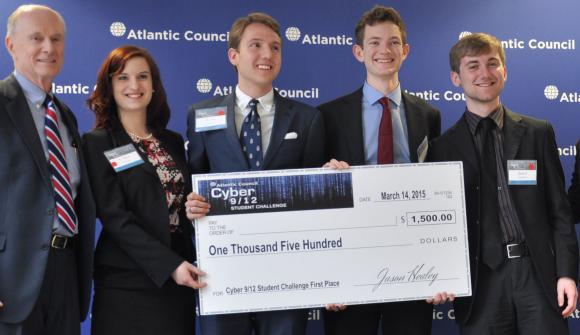PROVIDENCE, R.I. [Brown University] — A team of Brown University students has won first place in the Cyber 9/12 Student Challenge, a national cybersecurity policy competition held last weekend in Washington, D.C.
Team “Brown Secure” — Sam Brebner, Luke Camery, Jared Schober, and Celina Stewart — defeated 19 other collegiate teams to become the first all-undergraduate team to win the annual competition, which is in its third year. The event is sponsored by the Atlantic Council, a prominent international affairs think tank.
“The team did a marvelous job,” said John Savage, the An Wang Professor of Computer Science and the team’s faculty coach. “At each stage of the competition they demonstrated a command of the material and gave polished presentations. They demonstrated that they were able to think on their feet and worked very well together as a team. It was a very professional performance.”
The competition challenges teams to assess a mock international cybersecurity crisis and develop a set of policy recommendations for U.S. government officials.
“The idea is that you’ve had the equivalent of a 9-11, but in the cyber realm,” said Jared Schober, a junior concentrating in political science. “So it’s September 12; what do you do?”
The scenario for this year’s competition involved a cyberattack in the South China Sea against the Philippines, a U.S. ally. It was unclear who was behind the attack or if it was state-sponsored. The teams had to put together a set of recommendations aimed at defusing the situation without escalating tensions between the nations involved.
The competition unfolded in three rounds over two days. The teams received the scenario several weeks before gathering in D.C. In the first round, each team submitted a five-page policy document prepared ahead of time, and presented their recommendations to a panel of judges. Eight teams were selected to move on to the second round. In round two, the teams were presented with an evolution of the scenario, and were given a matter of hours to revise and present new recommendations. Four teams then advanced to finals, in which they had only a matter of minutes to react to an updated situation and present final recommendations.
The panel of judges — which included cybersecurity experts from the military, government, and private sectors — commended Brown Secure on its teamwork and ability to adapt its recommendations appropriately on their way to the win.
Celina Stewart, a junior in the international relations concentration, credited the team’s success in part to the diverse academic backgrounds of its members.
“Luke and Sam are computer scientists and Jared and I are more on the policy side,” she said. “It really worked out for us having people with different experiences on the team.”
What all four had in common was “Cybersecurity and International Relations,” a class offered by the Department of Computer Science and taught by Savage, a former Jefferson Science Fellow at the State Department and currently a professorial fellow at the EastWest Institute. All four team members had taken the class and three have served as teaching assistants for it. This is the second year Savage has taken students from the class to the competition.
“A lot of the skills and the general knowledge about how cybersecurity relates to international politics came from the course,” said Schober, who was also on last year’s team along with Brebner.
The students were happy with the win, but say the trip wasn’t all about the competition. The event also included keynote speeches by the likes of Gen. Michael Hayden, former director of the CIA and NSA, and Christopher Painter, coordinator for cyber issues at the State Department. The teams also had a chance to interact directly with the competition judges, as well as invited guests who have recently started careers in international relations.
“To be able to go up to these people, shake their hands, and ask them about their experiences was a great opportunity to have,” Stewart said. “It was a really great learning experience.”

